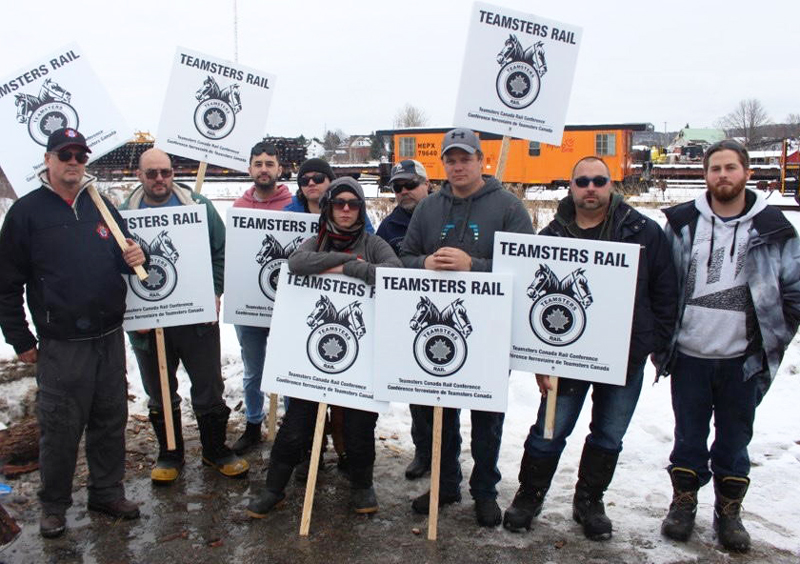MONTREAL — Some 9,300 freight workers at Canadian Pacific Kansas City and Canadian National — Canada’s largest railways — and over 1,200 Montreal port workers have voted by big majorities to strike for better contracts. The rail workers are members of the Teamsters and the port workers are represented by Canadian Union of Public Employees Local 375.
Rail workers rejected a series of concessions, including being forced to work 12-hour shifts rather than 10; a cut from 10 to five days for personal leave, which can be taken whenever workers need them; and job combinations that will pave the way for layoffs. They voted 98% to strike and could take action as early as May 22.
The strike vote shows “that whatever image the company tries to portray it’s not fooling the employees and shouldn’t fool anyone about their real intentions,” Eugen Bernard, a Canadian National conductor in Montreal, told the Militant.
Alexander Famili, who also works as a conductor at CN, said he thought “most people understand that our job is in general dangerous, and are probably on our side for wanting better conditions.”
Because of the economic weight of these workers in essential transportation, the capitalist rulers are calling on the government to rule that transport workers are “essential,” effectively barring them from striking. The bosses want to force the unions into compulsory arbitration where a government-appointed bureaucrat dictates wages and working conditions.
“But they can’t put 1,000 port workers in prison,” Samuel Lupien, a Montreal port worker, told the Militant at the port parking lot.
Montreal port workers voted 99.5% to reject the Association of Maritime Employees latest contract offer April 21-22. Among the union’s demands are a 20% wage raise over four years and greater job security.
Three years ago, the government ended the port workers’ four-day strike, forcing compulsory arbitration on the union. But the government-appointed arbitrator’s report referred the key issues of hours and scheduling back for negotiations between the union and bosses. Those talks went nowhere.
Elsewhere, 81 Quebec City port workers, also members of CUPE, have been locked out for 19 months. An ironic sign on their picket line sums up the impact the bosses’ profit drive is having on their lives. “Wanted, longshore workers, single, no children, no friends, available 24-7,” it says. The bosses have kept the port running with scabs.
Right to strike under threat
Shipping bosses have long been fighting for port workers to be designated “essential workers” to prevent them from striking, but the Canada Industrial Relations Board rejected their demand March 14.
The industrial relations board bureaucrats’ unwillingness to challenge the workers’ right to strike reflects the impact of the strike waged by 7,400 British Columbia longshore workers last July, which shut down 30 ports for 13 days, including Vancouver, the largest port in Canada.
The Grain Growers of Canada, which speaks for major capitalist grain farmers, issued a thinly veiled call May 1 for government intervention to prevent a rail strike. “We are deeply worried about the impact a strike would have, not just on our operations but on Canada’s reputation as a reliable supplier,” it said.
During the last Canadian National strike in 2019 the government and bosses brought intense pressure to bear on the union to end the walkout, claiming that the rail workers’ action was causing an economic crisis, especially in agriculture.
Since then, working people won an important victory pushing back government intervention into union struggles. A federal judge in January ruled that the government’s invoking of the notorious Emergencies Act to shut down a truckers’ protest in Ottawa in 2022 was “unjustifiable.”
Canadian National conductor and Teamsters member Philippe Tessier contributed to this article.


